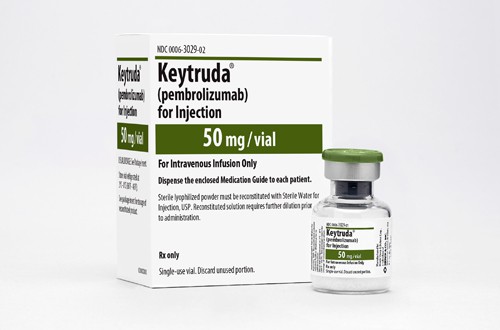
Merck/MSD’s Keytruda has demonstrated positive results in combination with chemotherapy in locally advanced or first-line metastatic oesophageal cancer.
The phase 3 KEYNOTE-590 trial evaluated Keytruda (pembrolizumab) in combination with chemotherapy in first-line oesophageal cancer.
The PD-L1 inhibitor met both primary endpoints of overall survival (OS) and progression-free survival (PFS) in the study, and improved outcomes compared to the current standard of care.
The study also met the key secondary endpoint of objective response rate, with signifiant improvements for the Keytruda combination compared to chemotherapy alone.
“Oesophageal cancer is a devastating malignancy with a high mortality rate and few treatment options in the first-line setting beyond chemotherapy,” said Roy Baynes, senior vice president and head of global clinical development, chief medical officer, Merck Research Laboratories.
“In this pivotal study, Keytruda plus chemotherapy resulted in superior overall survival compared with the current standard of care in the full study population and across all patient groups evaluated. These results build upon our research reinforcing the survival benefits of Keytruda, and we look forward to engaging regulatory authorities as quickly as possible,” he added.
Currently, Bristol Myers Squibb’s rival checkpoint inhibitor Opdivo (nivolumab) is Keytruda’s only potential competitor in oesophageal cancer. The drug scored US Food and Drug Administration back in June for the treatment of second-line unresectable advanced, recurrent or metastatic oesophageal squamous cell carcinoma that has progressed after chemotherapy treatment.
In the phase 3 ATTRACTION-3 trial, which evaluated Opdivo in this patient population, the PD-1 inhibitor met the primary endpoint of OS, demonstrating a 23% reduction in the risk of death and a 2.5 month improvement in OS when compared to chemotherapy alone. The survival benefit with Opdivo treatment was observed regardless of PD-L1 expression levels.
Keytruda is also already approved as a mono therapy for the second-line treatment of unresectable advanced, recurrent or metastatic oesophageal squamous cell carcinoma, but only for patients whose tumours express PD-L1.
According to Merck, the full detailed results from the KEYNOTE-590 trial will be shared with global regulatory authorities and will also be present at the upcoming European Society for Medical Oncology (ESMO) Virtual Congress 2020.




